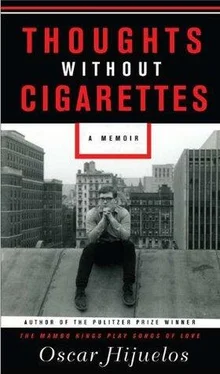As I went on, she wrote things down in pencil on a pad, occasionally looking up at me and uttering, “Uh-huh,” just as my friend had, her face betraying an opinion, so recently formed, that I was some kind of idiot trying to plead hardship to someone who had to spend her days in such a lifeless soul-destroying environment: I really didn’t have any excuse except that I had a friend who probably had his own problems or, without realizing it, had indeed fucked me — but I could have been kidnapped by aliens as far as that office’s directive about obtaining monies owed was concerned: It just didn’t matter. After listening to my excruciatingly banal excuse — in essence, that my life had been going too well for me to be bothered with such things — she put down her pencil and smiled, though not widely.
“Mr. Hidjewlos,” she told me, “I am very sympathetic to your circumstances, but if I were you, I’d go out as soon as possible and find a good accountant. We’ve got some restitution coming to us.”
It would take me over a year and a half to pay the IRS and New York State their back taxes, but while I’d remain mystified by how my good deed had backfired on me, at least one nice thing came of it: My downstairs neighbor, directly below my apartment, was a black psychiatrist who used to hate my guts and accuse me of being a racist because, having to turn up at TDI most days, I’d be forced to bang on the floor at three in the morning to get him to quiet down. A cool night owl with some kind of state-of-the-art stereo system, he loved to crank up his speakers when the whole rest of the world tried to sleep, while he listened to the cool jazz of WGBO, whose programming came through my floor so clearly I could make out the DJ’s words, and every riff, every drumbeat, every agitating sax regurgitation of forms and musical motifs I’d heard a million times before — to the point it would drive me crazy. I’d tap the floor with my knuckles, then pound at it with my fist, and he’d turn it down a little, but then, just as I’d be slipping back to sleep, it would get louder again, until finally I’d have to go downstairs and knock on his door.
Barely even looking at me, he’d say, “All right, all right.” But I’d have to do so every night. After a while, I’d get so agitated, I’d take my electric guitar and, turning my amp down against the floor, crank out the craziest and most irritating blues riffs you’ll ever hear: More than once, we’d have more than a few unkind words, his opinion coming down to this: “You are only complaining because you hate Negroes and are a racist.”
I’d pretty much forgotten about that, when, having returned from Italy, I heard the heavy bass of some moody Miles Davis tune coming through: This time, though, when I tapped (not banged) on the floor, he turned the volume down really low; guess he must have thought I was my friend. Eventually, he caught wind that my friend had moved out and when I ran into him a few days later, he told me: “At first, I couldn’t believe it was you who rented out the apartment to a black man.”
And with that he offered me his hand: That was the one good thing that happened.

That next year, regressing into an anxious state of mind, and forced to hustle around for money, I became a voracious smoker again. Because I didn’t want to start up with another full-time job downtown, which I could have wrangled through connections — how could I become a copywriter after I’d won a Rome Prize? — I found myself taking on any kind of teaching job, though not at any university: I just never considered myself accomplished enough to teach writing on a college level. (There was more to this: I wasn’t in any loop — while most of my former classmates had, at that point, been teaching in different colleges for the past ten years or so, I, a latecomer, would have been lucky to land a few courses as an adjunct, but even then, as I always had, I felt as if I needed more experience as a writer before presuming to teach others — something that apparently hasn’t bothered entire generations of creative writing teachers.)
I ended up working at three venues, as it were: One was a suicide ward at the Gracie Square Hospital, the other a terminal cancer ward at Payne Whitney. And I taught at the Amsterdam House, an old-age home up on 112th in my old neighborhood. For suicidal, seriously depressed, and troubled folks, I learned that you had to establish some very specific writing rules: “Please, no blood from orifices or from any acts of violence. No mention of the devil or the use of the color black.” That kind of thing. Among my students was an Ursuline nun, somewhere in her late fifties, who, descended from Italian nobility, had slashed her wrists simply because she woke up one day and realized that she did not believe in God and had therefore wasted her life. She wrote, however, remarkably spiritual poetry. The terminal cancer ward was more problematic. Whereas most crazy people, in my experience, enjoy being told that they are, indeed, crazy, there is nothing one can say to someone dying of cancer to relieve him of that ultimate disappointment and agony.
Falling back not on what I had learned from Sontag or Barthelme but from my own mother, whose poetic strivings over the decade or so since my pop’s death had grown more sophisticated, I had them write about the most important or happiest days of their lives — in prose or poetry — and for a short while, at least, I seemed to have lifted some of them out of their own bodies and miserable fates. And I found that it helped to adopt a tender, almost priestly manner with them: It helped that I do believe there is something (unimaginable) awaiting all of us (owed to my Catholic barbarity or, as some prick psychiatrist once said to me, to my lingering childhood fantasies of finding “Daddy” and therefore salvation). Mainly, I just tried to emulate the kindly people I knew, and that seemed to make a difference to them, though there is no amount of preaching or kindness that can take the place of morphine. The old-age home was the happier experience: Among my students was a 107-year-old woman, a former doctor from Missouri, who had maintained a lucid mind while her body had shriveled up to the size of a small, gnarl-limbed child’s. (Hers was the story of how she became the first female doctor in her state.) Though I never cared for the smell of musty death in such a place, nor the natural melancholy of the aged, I felt at least that I was easing their exits from this life in some little way. Heading home with a few dollars in my pocket and happily lighting up a smoke, I’d feel some sense of accomplishment until, at some later hour, I’d take stock of myself and realize that at my age, thirty-six, I really wasn’t anywhere at all.

Yet, having to make quarterly payments to the IRS, I was hardly making ends meet — thank God one could pay such cheap rents back then. Once my grant-funded jobs ran out, however, I went back to working for Manpower as a file clerk — but it left me so depressed that I quickly gave up on it. One day, out of the blue, I received a letter from an upstate arts group located in the town of Lake George, offering me a teaching job for some six months, for which I would be paid the regal sum of five thousand dollars: It wouldn’t solve most of my problems, but it wouldn’t hurt.
Eventually, as well, it hit me that the only way I would ever be able to pay off my debts was to sell a book. That’s when my agent, Harriet Wasserman, came in: I’d known her since 1984, and though I’d never earned her a dime in commission, nor given her anything to shop around, she provided me, as had Barthelme, the kind of encouragement that folks starting out in the business need. From time to time, I’d have lunch with her or she’d send me off to meet an editor to whom she had talked up my talent. The two I recall meeting, before I went off to Italy, were much admired old-school publishing men, the likes of which no longer exist: Harvey Ginzburg and Corliss “Cork“ Smith, classy fellows either of whom I would have, in fact, been happy to work with. Though I had first been referred to Ms. Wasserman by my editor at Persea, she had no interest in my staying there. (Nor did I: One of their mantras, though most often true, but which a person from my background just didn’t want to believe, had it that I should never expect to make any money as a writer.) Unfortunately, I didn’t have much of anything going on in those days. As far as I was concerned, that novel about those two Cuban musicians, which I had been writing on and off for the past three years or so, and which I hadn’t bothered to show anyone, didn’t even begin to strike me as the kind of book that mainstream publishers would be interested in, mainly, I think, simply because its subject matter was Latino.
Читать дальше














